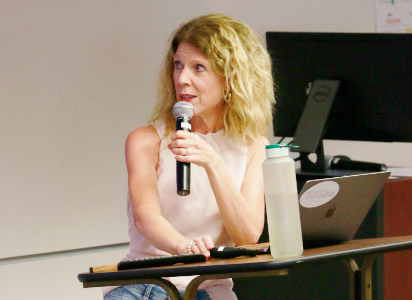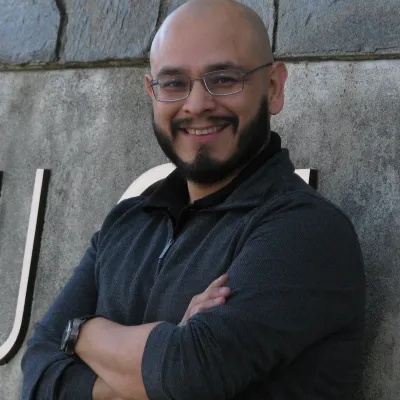
Dr. Stacey Fraser - Music
In the Spring of 2025, Dr. Stacey Fraser collaborated with her students to stage an opera that achieved such success that it was performed both at CSUSB’s main campus and the Palm Desert Campus. Their production was an interpretation of the AIDS Quilt Songbook, brought to life with support from the Title V Grant, Pathways to Success. This support enabled the group to powerfully convey the story and highlight the profound impact of the AIDS epidemic on the Queer and Transgender communities.
When asked how the project connected students with other disciplines, the community, or the practical applications of their coursework, Dr. Fraser responded:
“A record number of students participated in the interdisciplinary activities, workshops, and rehearsals that united music, theatre, and the humanities. Students from CSUSB engaged deeply in dramaturgical research, private coaching, and collaborative rehearsals—fostering not only a shared appreciation for the arts but also developing skills that extend far beyond the classroom.”
If you are interested in learning more, click below!

Guillermo Avilés-Rodríguez
Directed by Guillermo Avilés-Rodríguez, with support from the Title V Grant Pathways to Success, the Ellen Weisser Endowed Theatre Showcase, and ALFSS, You Don’t Even Speak Spanish! was presented at California State University San Bernardino in Spring 2025. This production ran from April 25th, 2025, to May 4th, 2025. The production is a blend of live performances, multimedia projections, and bilingual supertitles. The production brought together students from Spanish, theater, and multimedia programs in an advanced, interdisciplinary, experiential learning environment. There was also reported growth in bilingual performance, technical production, and cultural analysis. The production was entered in the Kennedy Center American College Theater Festival (KCACTF), which extends opportunities for student recognition, scholarships, and professional feedback.

Reflecting on the Impact of Asset-Based Teaching Judith Joshua and Lisbeth Rosales
Empowering Students to Learn Through Their Own Cultural Lens
Judith Joshua and Lisbeth Rosales from San Bernardino Valley College attended one of Pathways to Success Asset-Based Teaching events, and after reaching out to them about their progress, this is their combined response.
- What is one highlight or success you experienced while implementing asset-based teaching in your course?
Both Judith and Lisbeth attended the Asset-Based Teaching Workshop at CSUSB and applied what they learned in their classes. Both helped their students culturally express themselves to engage with the class material more, and they wanted to help them understand their cultural identity. Judith, being a writing professor, provides a space for her students to write about themselves without limits and without checking boxes, which resulted in more reflective and personable assignments. Lisbeth, a professor of Latin Culture and Civilization, decided to lead the charge and share her cultural tree, helping students feel less judged when sharing their own.
- Can you share a short example of how asset-based teaching supported your students?
Both professors adjusted some of their assignments, which led to more students engaging with the content. Judith created an assignment that prompted her students to explore different ways to express and guide themselves in understanding their own core values. Lisbeth decided to change how she graded, which resulted in her students feeling less pressured to get the answers correct. Instead, they were encouraged to understand the lectures and concepts, make connections between the lectures and the homework, and engage with the lessons without the pressure of memorizing the answers.
- How has this influenced your teaching practice going forward?
They both were influenced and inspired to start taking charge with their students by empathizing, being more understanding, and encouraging students to use their strengths in their classes. Judith is reformatting one of her writing assignments to highlight students' core values in a more academic setting, while Lisbeth is now catching on to where she might be biased in an area and has started to be more direct with her students, checking up on them and making sure they are good when it comes to class.